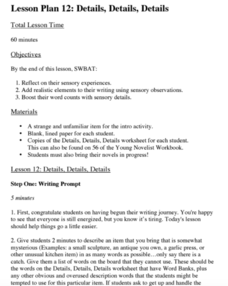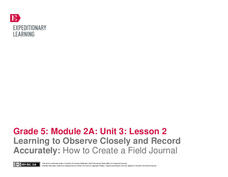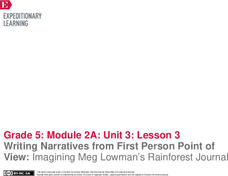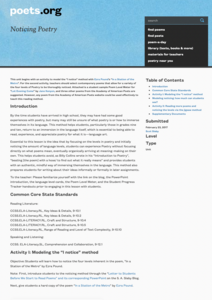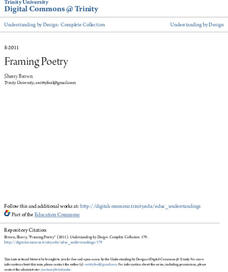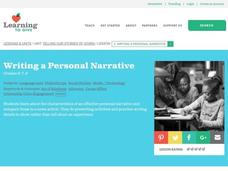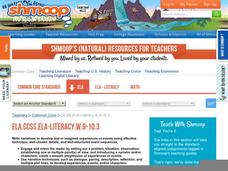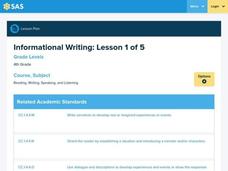Curated OER
Details, Details, Details
Writing can become one-dimensional if authors don't involve all their senses. First, scholars observe a strange object which, ideally, they can touch and even smell. Without using certain words (you can create a list or have the class...
Curated OER
Come To Your Senses
Write narratives that include ideas, observations, or memories of an event or experience, and be sure to use concrete sensory details! Groups utilize a few of the famous I Spy books in order to create narratives that utilize sensory...
Curated OER
"Snapshot" Exercises & Sensory Detail Word Bank
Read a sample of creative descriptive writing to your science class. Discuss how writing can be used to record and communicate observations that scientists make. Reading selections and thought-provoking questions are suggested. Also...
K20 LEARN
Who's Coming To Dinner? Descriptive Writing
"The Dinner Party" is the anchor text in a lesson designed to encourage writers to use sensory details in their stories. After brainstorming descriptive words and phrases for the five senses, class members read Mona Gardner's...
EngageNY
Learning to Observe Closely and Record Accurately: How to Create a Field Journal
Look carefully. Scholars practice observing and recording the natural world around them by looking out a window or viewing an image. Learners discuss how their experience compares to that of Meg Lowman in The Most
Beautiful Roof in the...
Curated OER
Let's Go Exploring!
Use a Courbet painting of a cave or tunnel opening to reinforce the importance of descriptive writing. Writers of all ages use sensory details to describe what the scene depicts as they pretend to be in the painting. Then they imagine...
Berkshire Museum
Nature Journaling: Experience the Outdoors Through Writing and Drawing
Step into the great outdoors and develop young scientists' skills of observation with a nature journaling lesson plan. Given a specific focus or goal, children practice making and recording observations of nature through written...
Curated OER
Language Arts: Telling a Painting's Story
Use art museum paintings as inspiration for your class's creative writing works. Observing the paintings closely, middle and high schoolers list details and write descriptions. Their completed stories are displayed on bulletin boards...
Curated OER
From Light to Dark and Back
Experiment with light and dark in a series of interactive activities that lead up to reading and writing poetry. Class members have the opportunity to observe their feelings while sitting in the light and dark and to play with shadow...
EngageNY
Writing Narratives from First Person Point of View: Imagining Meg Lowman’s Rainforest Journal
I spy with my little eye! Learners observe page 23 in The Most Beautiful Roof in the World and practice what they would add to a field journal. They discuss how details from the text help add to their thoughts. To finish,...
Curated OER
Essential Elements of Habitat
First graders compare their local area with the Belize landscape. They construct maps of the school area, adding descriptive information. They write haiku poems about their favorite outside places.
Academy of American Poets
Noticing Poetry
Introduce scholars to the "I Notice" method, a different approach to studying poetry. Instructors first model the noticing method by identifying words and images that appeal on the sonic level, the ideational level, the sensory level,...
Curated OER
Writing Organizers
Eight graphic organizers to choose from? That's right! Each of these organizers relates to writing or reading. From narrowing a writing topic, to responding to literature, to planning a writing project, you'll find many purposes for...
Rainforest Alliance
Knowing the Essential Elements of a Habitat
To gain insight into the many different types of habitats, individuals must first get to know their own. Here, scholars explore their school environment, draw a map, compare and contrast their surroundings to larger ones. They then...
Trinity University
Framing Poetry
The big idea in this poetry unit plan is that structure and content work together to create meaning. Class members learn how to identify and mark the metrical patterns and line lengths used in poems. They study the structure of various...
Curated OER
A Sense of Place
Students read "Fish Tale: Falling For a Live One" from The New York Times and discuss the methods and techniques the writer uses to create a strong mental image. Students pick a place in their community they wish to write about and...
Curated OER
My Favorite Room
Students practice describing a room. In this descriptive writing lesson plan, students use all of their five senses to describe their favorite room. The teacher will model for the class by creating a word list that describe the classroom...
Southern Nevada Regional Professional Development Program
“Tell Me a Story”: Moving from Reading to Writing
Narrative essay writing is the focus of a series of exercises that model for learners how to not only read a narrative, but how to also examine the techniques fiction writers use to create a setting, develop their characters, represent...
Curated OER
Writing a Personal Narrative
Students learn characteristics of an effective personal narrative. In this personal narrative instructional activity, students discover ways to show rather than tell, adding richness and detail to their writing. Students...
Curated OER
Using Descriptive Language
Students explore the technique of descriptive writing. As a class, they observe a poster and describe it using adjectives. They discuss how descriptive words can be used literally and figuratively in the world of advertising. After...
Shmoop
ELA.CCSS.ELA-Literacy.W.9-10.3
Teach your class the basics of narrative writing! The resource first describes the Common Core standard for narrative writing in-depth, and then moves into how to apply the standard. Show your class the example essay and quiz them...
Monarch High School
TP-CASTT Practice
Acronyms can help learners remember facts and analyze poetry. This resource includes graphic organizers for TP-CASTT, SOAPS, SOAPSTone, and DIDLS. Class members can try out one or all of these strategies to assist with that difficult job...
Curated OER
Visual Aural Impressions
Young scholars view a piece of impressionist art, listen to a piece of jazz music and then write a piece about the picture in the style of beat poets. They compare their writing and look for differences in their perceptions.
Pennsylvania Department of Education
Informational Writing
Emerging writers identify an informational piece of writing. They are provided with examples of informational writing and view a PowerPoint on narrative writing. Then, they design their own informational writing with a brochure,...
